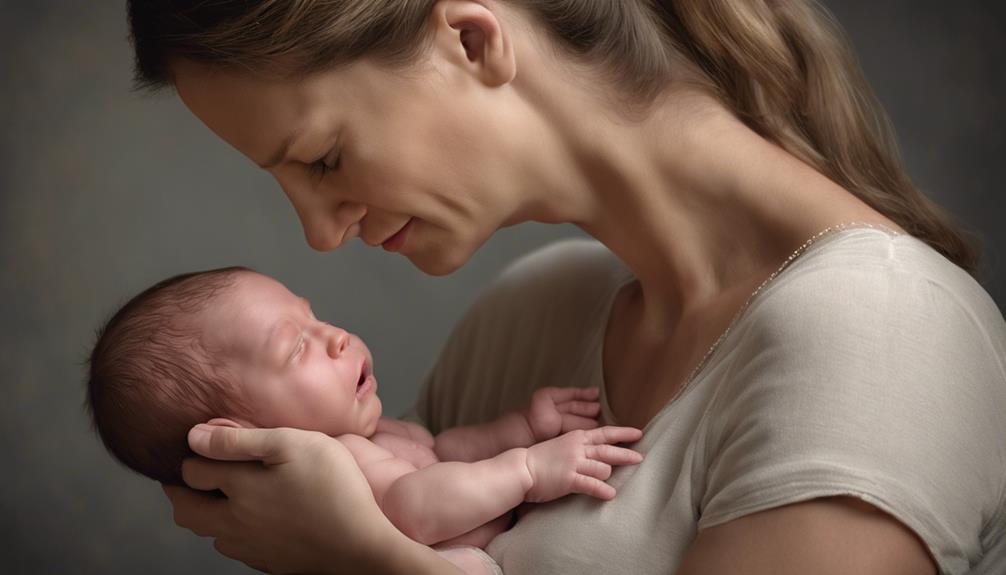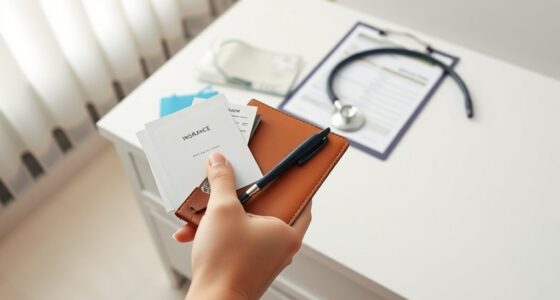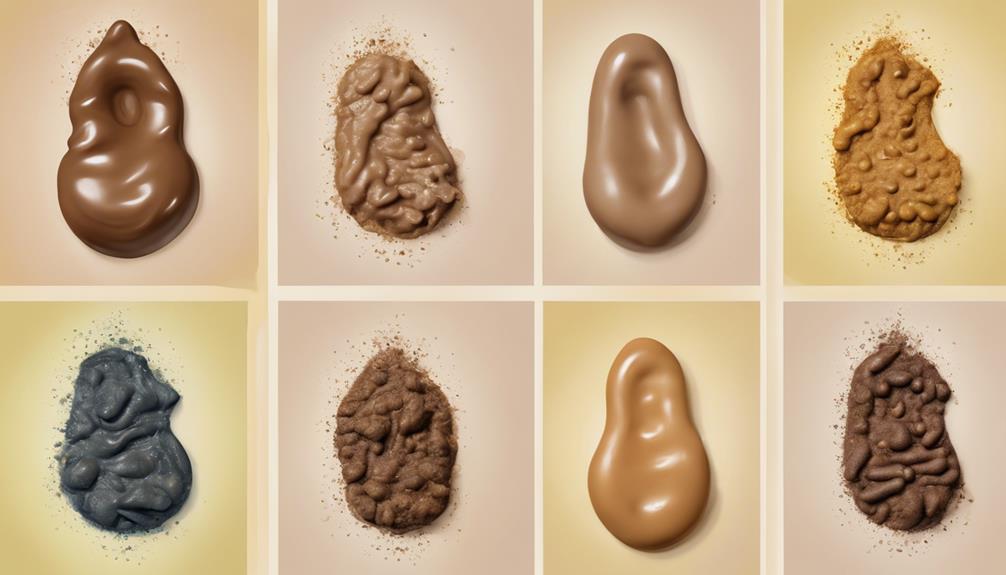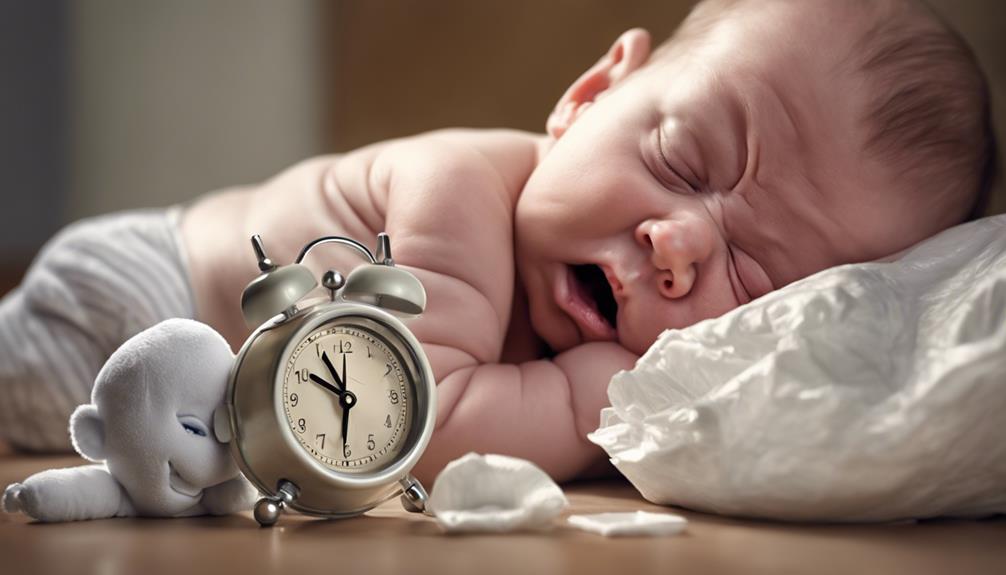Imagine your newborn is like a delicate flower swaying in the wind, fragile and in need of gentle care. When those unexpected hiccups disrupt their peaceful slumber, you're left wondering how to provide quick relief.
But fear not, there are simple yet effective techniques that can help ease your baby's hiccups swiftly. From tried-and-true burping methods to soothing pacifiers, the solution might be closer than you think.
Stay tuned to discover the secrets to stopping newborn hiccups in their tracks.
Key Takeaways
- Burping during or after feeding helps release trapped air, preventing and stopping newborn hiccups.
- Offering a pacifier relaxes the diaphragm and stimulates the sucking reflex for quick hiccup relief.
- Gently rubbing the back and holding the baby upright against the shoulder are effective methods to stop hiccups.
- Implement preventive measures like proper feeding techniques to minimize the occurrence of newborn hiccups.
Causes of Newborn Hiccups
Newborn hiccups often occur due to various triggers that lead to irritation of the diaphragm, causing those quick, jerky movements and the familiar hiccup sound. When your baby feeds too quickly or swallows air during feeding, it can irritate the diaphragm, resulting in hiccups. Additionally, factors like the Tonic Neck Reflex, sudden temperature changes, overfeeding, stress, or excitement can also trigger those adorable yet bothersome hiccups in your little one.
Understanding these causes can help you prevent and manage your baby's hiccups more effectively. Ensuring your baby burps during and after feeding can help release any trapped air, reducing the likelihood of hiccups. Remember, your baby's tiny diaphragm and vocal cords are still developing, making them more prone to irritation and hiccups. By being mindful of these triggers, you can create a more comfortable environment for your baby, reducing the frequency of those cute but persistent hiccups.
Quick Remedies for Hiccups

To address those pesky hiccups in your little one, try these quick remedies that can help provide relief and comfort.
Burping your baby during or after feeding is a simple yet effective way to release trapped air and stop hiccups quickly. Offering a pacifier can also work wonders by relaxing the diaphragm and halting hiccups in newborns.
If your baby is hiccuping, gently rubbing their back can help alleviate diaphragm spasms causing the hiccups. Changing your baby's position, like holding them upright against your shoulder, can aid in stopping hiccups promptly.
Effective Burping Techniques

When burping your baby, remember to hold them against your chest and gently pat or rub their back to release trapped air effectively.
Burping is important as it helps prevent newborn hiccups by releasing trapped air in their stomach. Proper burping techniques, such as holding your baby upright and patting their back during and after feedings, can greatly reduce the chances of hiccups.
For bottle-fed babies, burping every 2–3 ounces is recommended to minimize gas buildup and discomfort. By releasing air through burping, you can prevent hiccups and make sure your baby remains comfortable and content.
Pacifier and Hiccup Relief

Using a pacifier can be a soothing and effective way to help alleviate hiccups in your little one quickly. When considering pacifier use for newborn hiccups, here are some key points to keep in mind:
- Relaxing the Diaphragm: Offering a pacifier may help relax the diaphragm, potentially aiding in stopping hiccups promptly.
- Stimulating Sucking Reflex: Sucking on a pacifier can stimulate the baby's sucking reflex, which may assist in resolving hiccups faster.
- Providing Comfort and Distraction: Pacifiers can offer comfort and distraction, helping to calm your baby and alleviate hiccups effectively.
- Gentle and Non-Invasive: Using a pacifier for hiccup relief is a gentle and non-invasive method that can provide your newborn with safe and gentle relief.
Tips for Preventing Hiccups

If your newborn is frequently experiencing hiccups, implementing preventive measures can help minimize their occurrence and guarantee your baby's comfort.
To prevent baby hiccups, remember to burp your little one frequently during and after feedings. This helps release any trapped air that could lead to hiccups. Additionally, feeding your baby smaller amounts more often can reduce the chances of hiccups occurring.
Keeping your newborn in an upright position for around 20-30 minutes after feeding can aid in digestion and lessen the likelihood of hiccups. When bottle-feeding, using a slower-flow nipple can help prevent newborns from swallowing excess air, which is a common cause of hiccups.
Frequently Asked Questions
How Do I Relieve My Newborns Hiccups?
To relieve your newborn's hiccups, try burping them, offering a pacifier, changing their position, gently rubbing their back, and avoiding overfeeding. These methods can quickly help release trapped air and relax their diaphragm for relief.
Is It OK to Lay Baby Down With Hiccups?
It's safe to lay your baby down with hiccups as long as they seem comfortable. Most babies can sleep well with hiccups that usually go away on their own. Monitor for any distress and try gentle soothing if needed.
What Is the Best Position for Baby Hiccups?
When your baby has hiccups, holding them against your chest or supporting them in a forward-leaning position can help ease it. Ensuring a calm environment, gentle patting, and slight head elevation aids in stopping hiccups quickly.
Do Hiccups Mean Baby Is Full?
Hiccups in babies don't necessarily mean they're full. They're often due to diaphragm irritation, not a sign of being satisfied. Address the cause, like air swallowing or immature digestion. Smaller, more frequent feedings can help.
Conclusion
So, there you have it! Next time your little one starts hiccuping, remember these quick and easy remedies to stop them in their tracks.
Say goodbye to those pesky hiccups and hello to a happy, hiccup-free baby. Remember, prevention is key, so create a calm feeding environment and burp your baby effectively.
Keep those hiccups at bay and enjoy some peaceful moments with your little one. Cheers to a hiccup-free day!









